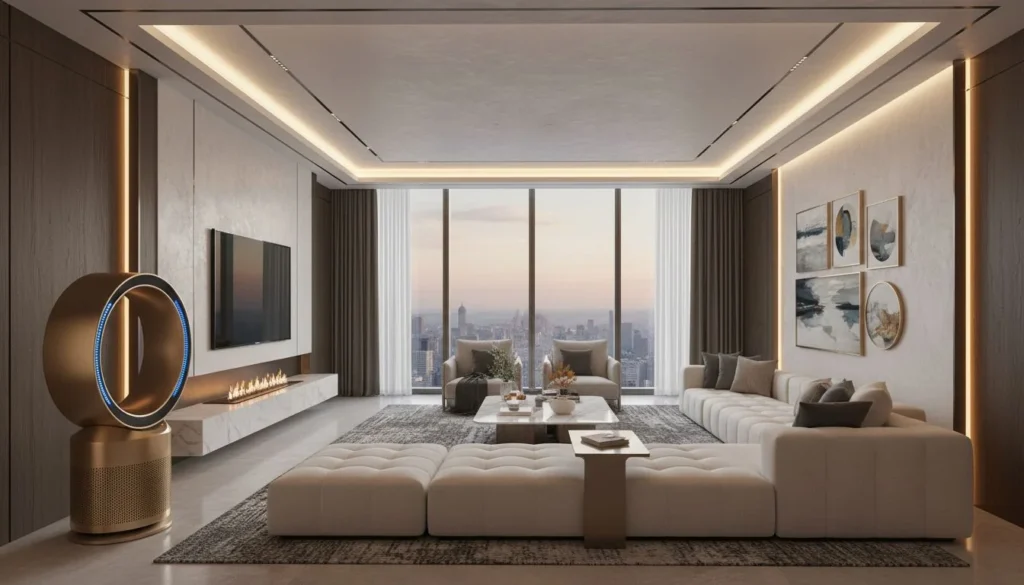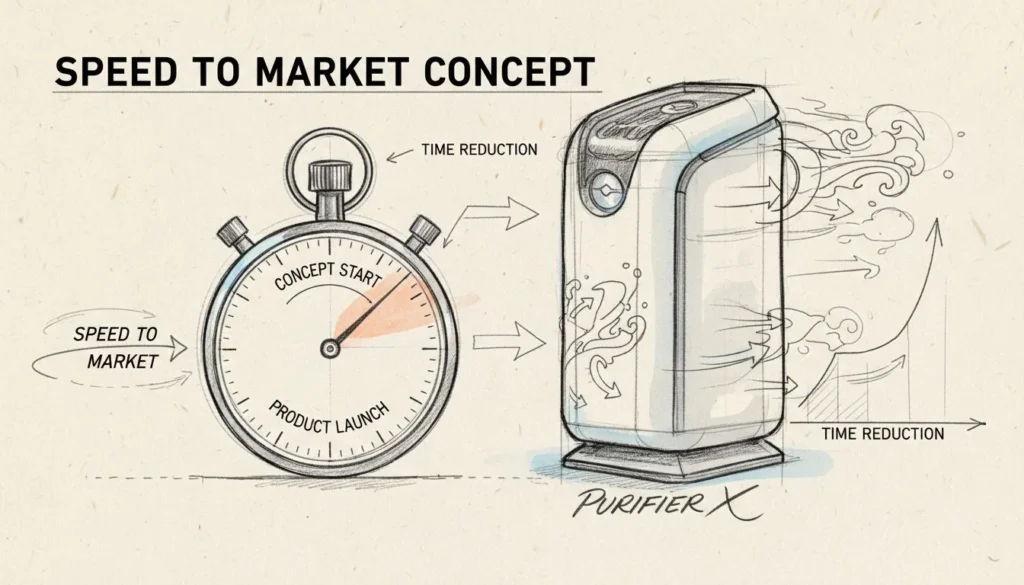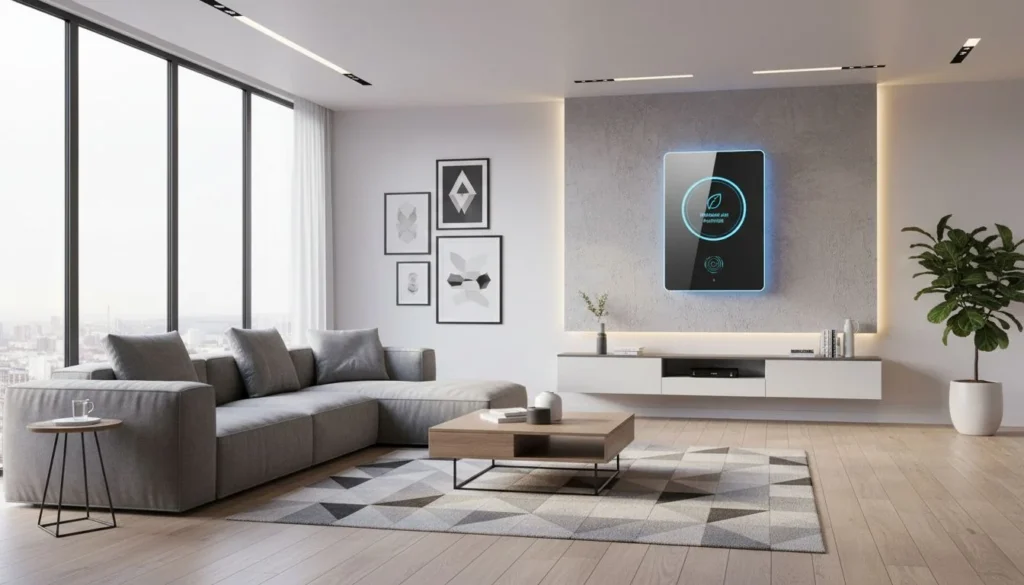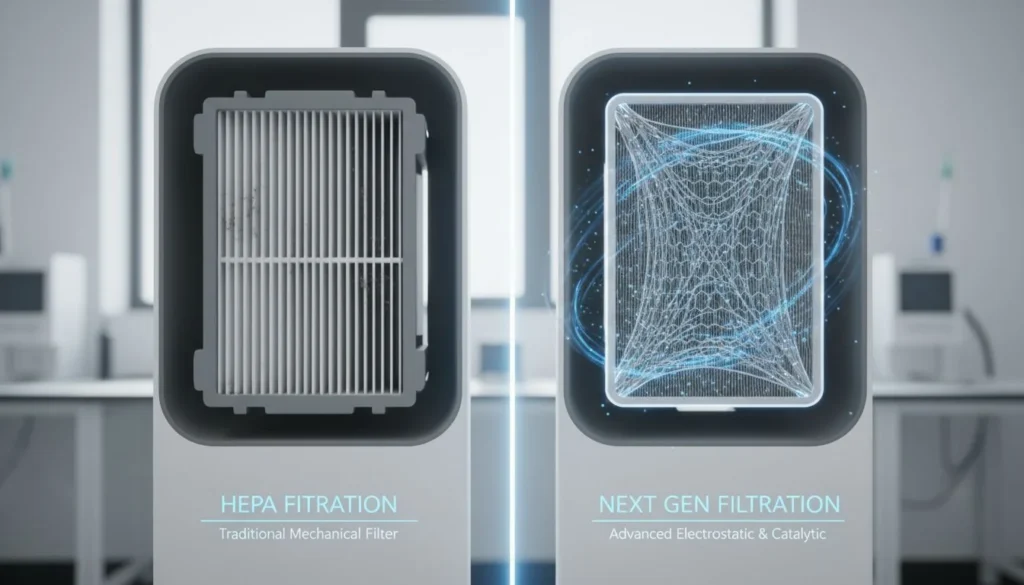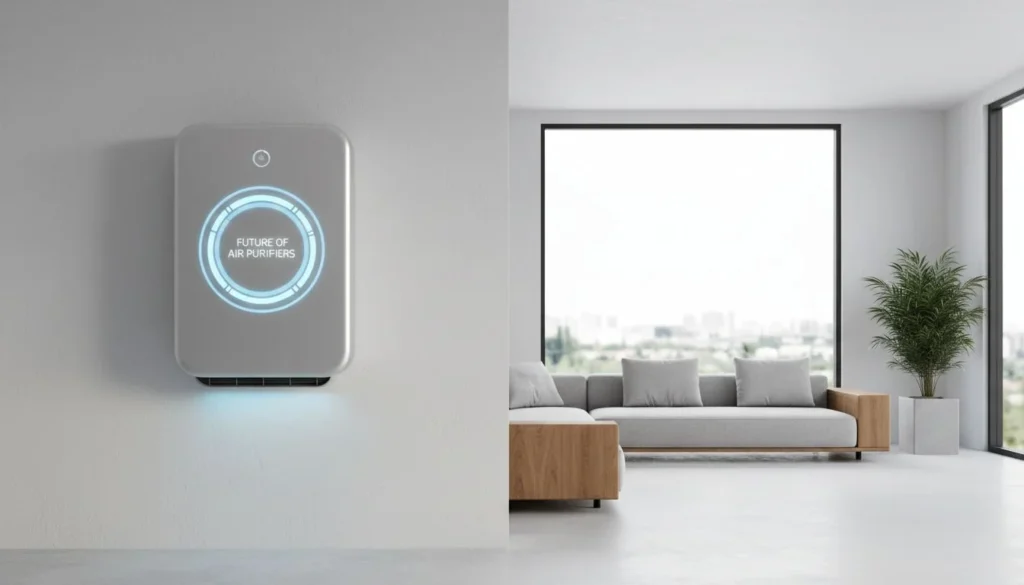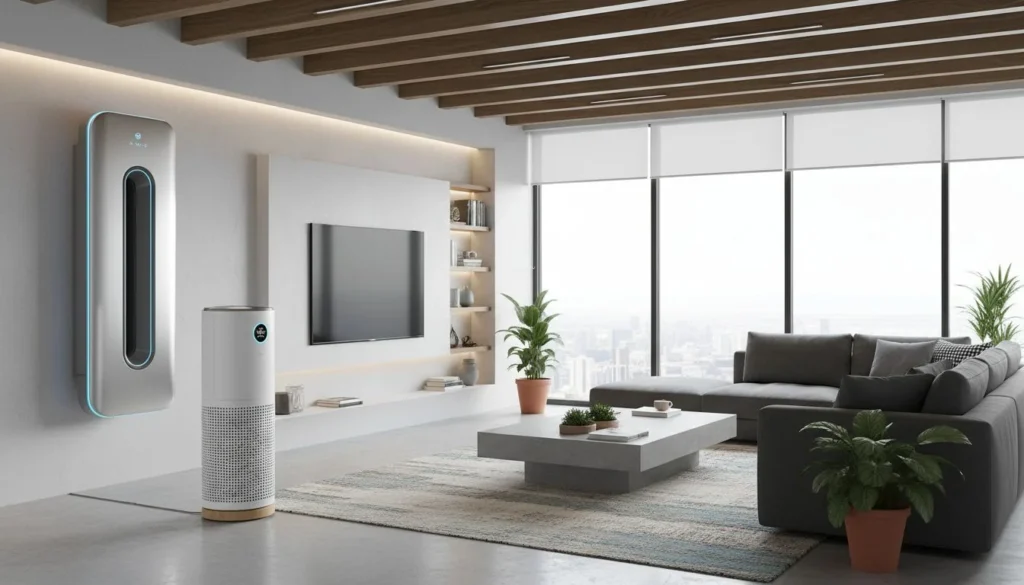HEPA 필터는 공기 중 입자를 효과적으로 포집하고 다양한 환경의 공기질을 개선하는 데 사용되는 공기 정화용 필터로 널리 사용되고 있습니다. 최근에는 먼지, 알레르겐, 박테리아, 심지어 바이러스까지 제거하는 높은 효율성으로 인해 가정, 학교, 병원, 사무실의 공기청정기에 필수적으로 사용되고 있습니다.
HEPA 필터란 무엇인가요?
HEPA(고효율 미립자 공기) 필터는 0.3마이크론 크기의 입자를 99.97% 포집하여 공기 중의 오염 물질을 제거합니다.1먼지, 꽃가루, 애완동물의 비듬, 일부 박테리아 및 바이러스 등을 제거합니다. 효율성이 뛰어나 깨끗한 공기가 필수적인 환경에 이상적입니다. 예를 들어, HEPA 필터는 알레르겐을 줄이는 데 특히 효과적이어서 민감한 사람의 호흡기 문제를 완화할 수 있습니다(출처).
HEPA 필터의 작동 방식, 장점 및 한계를 이해하면 올바른 공기청정기를 선택하는 데 도움이 됩니다. 계속 읽으면서 HEPA 필터와 다른 여과 기술 및 비교 방법에 대해 자세히 알아보세요.
예, HEPA 필터는 의료 시설에 적합합니다.True
HEPA 필터는 효율이 높기 때문에 의료 환경에서 오염 물질이 없는 공기를 보장하기 위해 자주 사용됩니다.
공기청정기에 HEPA 필터가 효과적인 이유는 무엇인가요?
HEPA 필터는 특히 다음과 같이 청결이 가장 중요한 환경에서 공기 정화에 매우 효율적입니다. 의료 시설2. HEPA 필터의 촘촘한 섬유 구조는 광범위한 입자를 걸러내어 알레르기 유발 물질, 먼지 및 기타 오염 물질을 줄여주는 정화된 공기를 제공합니다.
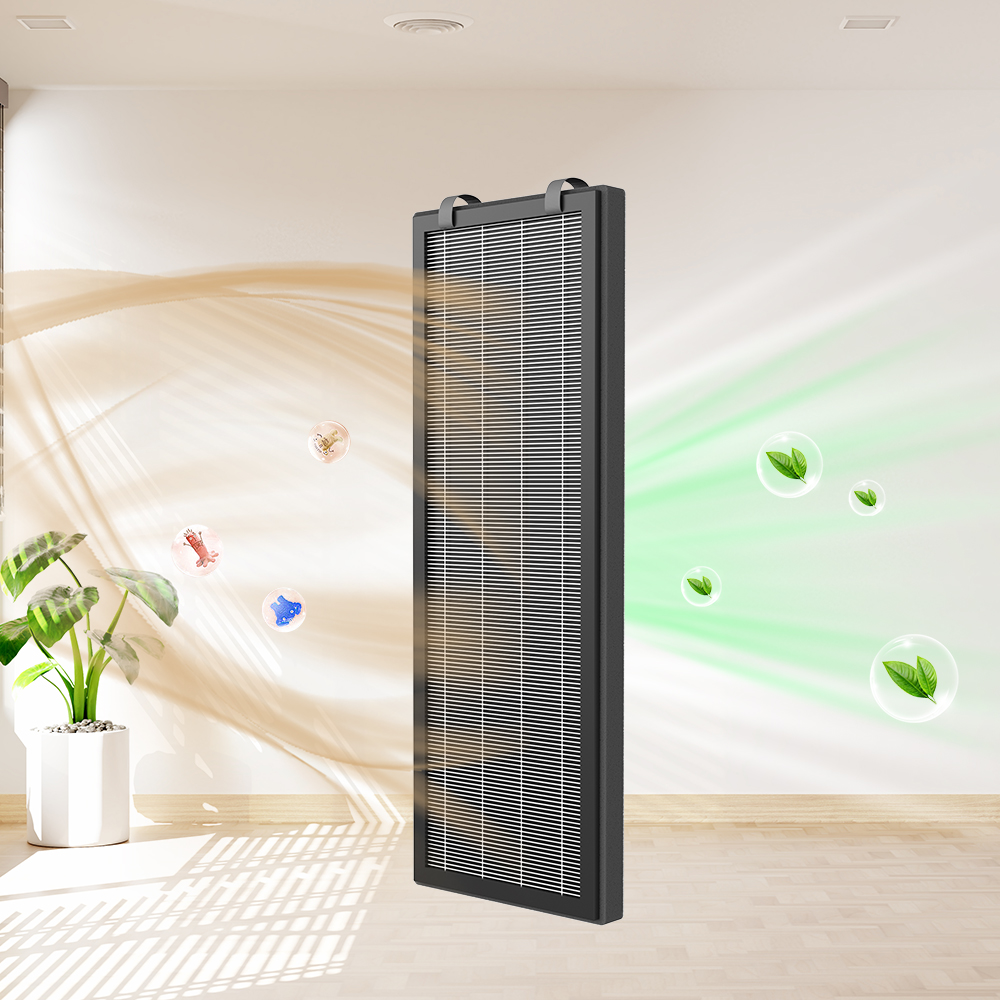
HEPA 필터 작동 방식
HEPA 필터는 작은 오염 물질을 놓칠 수 있는 기존 필터와 달리 유해한 입자를 가두는 미세한 망을 통해 공기를 강제로 통과시키는 방식으로 작동합니다(출처). 이 필터는 99.97%의 공기 중 입자를 제거하는 데 매우 효과적이며 알레르겐과 자극 물질을 포집하여 깨끗하고 숨쉬기 좋은 공기를 제공합니다. 공기청정기의 HEPA 필터는 지속적으로 작동하여 하루 종일 높은 공기질을 유지합니다.
HEPA 필터와 다른 여과 기술 비교
다음과 같은 다른 공기 정화 방법과 비교했을 때 이온 발생기, 플라즈마 필터 또는 자외선HEPA 필터는 인체 건강을 위해 더 안전하고 신뢰할 수 있는 옵션을 제공합니다. 이온화 그리고 플라즈마 기술 이온 또는 반응성 입자를 생성하여 다음을 유발할 수 있습니다. 오존 형성3-호흡기 자극제 (출처). 그러나 HEPA 필터는 부산물을 방출하지 않고 입자를 물리적으로 포집하기 때문에 실내 공기질을 유지하는 데 선호되는 선택입니다.
HEPA 필터는 VOC와 같은 가스를 포집할 수 있습니다.False
HEPA 필터는 가스나 냄새가 아닌 입자를 포집하도록 설계되었으며, VOC에는 활성탄 필터가 필요합니다.
필터링 기술 비교
차이점을 이해하는 데 도움이 되도록 다양한 필터링 기술과 그 특성을 비교한 차트를 소개합니다:
| 필터링 기술 | 효율성 | 부산물 | 일반적인 애플리케이션 | 주요 이점 | 제한 사항 |
|---|---|---|---|---|---|
| HEPA 필터 | 높음 | 없음 | 가정, 병원, | 99.97%의 입자를 제거합니다. | VOC와 같은 가스를 제거하지 않습니다.4 |
| 사무실 | 0.3 미크론까지 | ||||
| 활성탄 | 보통 | 없음 | 공기청정기, HVAC | VOC, 악취 흡착 | 미립자에는 덜 효과적 |
| 이온 발생기 | 보통 | 오존 | 산업, | 알레르기 유발 물질 및 입자 감소 | 오존은 호흡기를 자극할 수 있습니다. |
| 공기 청정기 | |||||
| UV-C 빛 | 변수 | 없음 | 병원, 실험실, | 박테리아 및 바이러스 제거 | 입자에 대한 제한된 효과 |
| 공기 청정기 | |||||
| 플라즈마 기술 | 높음 | 오존 | 산업 | 살균에 효과적 | 반응성 파티클 생성 |
HEPA 필터의 이상적인 용도
HEPA 필터는 가정, 병원, 사무실 및 깨끗한 공기가 우선시되는 모든 환경에서 일반적으로 사용됩니다. 특히 알레르기와 호흡기 문제를 완화하는 데 도움이 됩니다.5. HEPA 필터는 미세 입자와 알레르겐을 포집하여 더 건강한 실내 환경을 조성합니다. 의료 환경에서 HEPA 필터는 병원균이 없는 공기를 보장하여 오염 위험을 최소화합니다.
HEPA는 무엇을 의미하나요?
HEPA 또는 고효율 미립자 공기는 공기 여과 효과의 표준입니다. HEPA 필터는 공기 중 오염물질의 대부분 크기인 0.3마이크론까지 99.97%의 입자를 제거해야 합니다. 이러한 높은 효율은 알레르기 유발 물질, 박테리아 및 오염 물질을 줄여 더 건강한 환경을 조성하는 데 도움이 됩니다(출처).
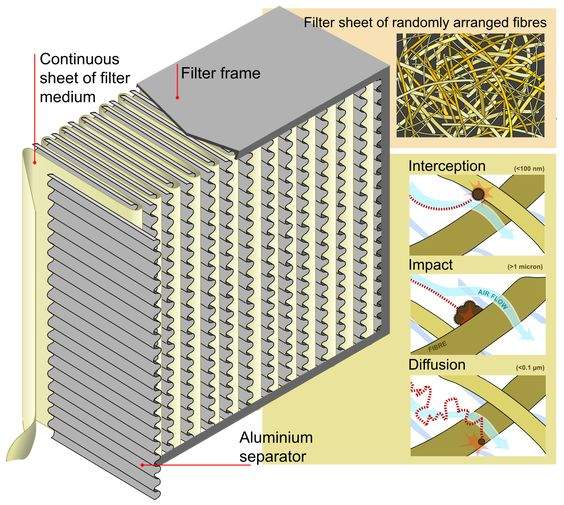
품질 표준화
규제 기관에서 정한 HEPA 표준은 필터가 공기 정화에 필요한 효율을 충족하도록 보장합니다. 이 표준은 일관된 고품질 공기 여과가 필요한 환경에서 HEPA 필터를 신뢰할 수 있는 선택으로 만듭니다.
HEPA 필터 사용의 이점
HEPA 필터는 알레르겐 제거 외에도 다양한 이점을 제공합니다. 특히 어린이, 노약자 또는 건강 질환이 있는 사람과 같이 취약한 사람들이 있는 공간에서 미세 여과 기능을 통해 호흡기 문제를 줄이고 더 깨끗하고 안전한 환경을 조성할 수 있습니다.6.
HEPA 필터는 공기질을 크게 개선합니다.True
HEPA 필터는 미세한 입자를 포집하여 실내 공기질을 개선하는 데 매우 효과적입니다.
HEPA 기술의 기원과 발전
HEPA 기술은 처음에 미군 2차 세계대전 당시 공기 중 방사능 입자로부터 병사들을 보호하기 위해 사용되었습니다.7. 그 이후로 HEPA 필터는 의료, 상업 공간 및 주거용 애플리케이션을 포함한 다양한 산업에 서비스를 제공하도록 발전해 왔습니다.
HEPA 미디어 기술의 발전
최신 HEPA 필터는 이제 다음과 같은 기능을 제공합니다. 첨단 미디어 기술 낮은 저항으로 더 높은 공기 흐름을 가능하게 하는8. 이러한 발전은 HEPA 필터가 장착된 공기청정기가 높은 팬 속도 없이도 더 많은 양의 공기를 효율적으로 정화하여 소음과 에너지 사용을 줄일 수 있다는 것을 의미합니다. 이러한 개선으로 HEPA 필터의 효율성이 더욱 향상되어 더 많은 사람들에게 더 깨끗한 공기를 제공할 수 있게 되었습니다.
HEPA 필터에 카본 필터가 필요한 이유는 무엇인가요?
HEPA 필터는 입자 포집에는 탁월하지만 휘발성 유기 화합물(VOC)과 같은 냄새나 가스는 제거할 수 없습니다.9. 이 문제를 해결하기 위해 많은 공기청정기는 HEPA 필터를 활성탄 필터는 VOC와 냄새를 흡착하여 종합적인 공기질 관리에 이상적인 조합입니다.
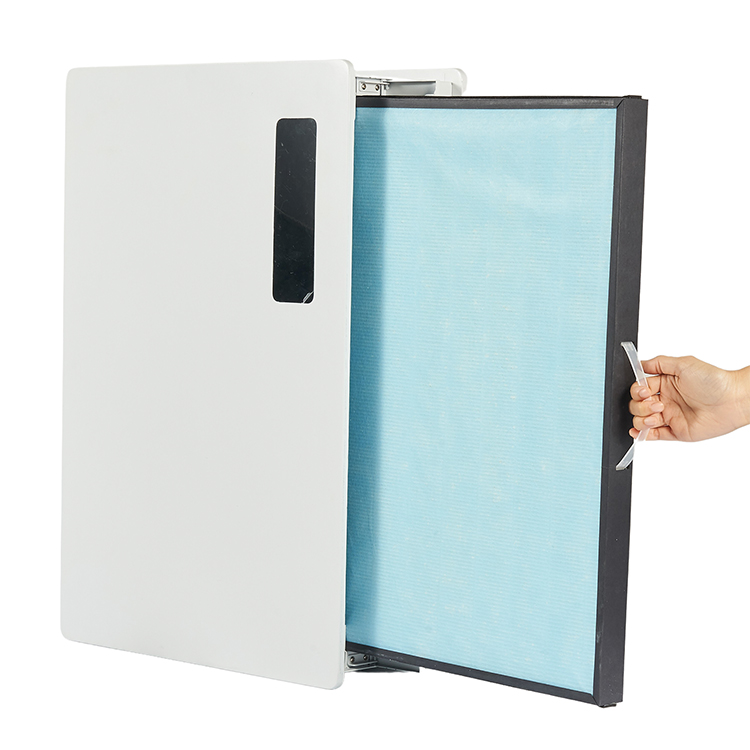
HEPA 필터와 탄소 필터를 모두 사용해야 하는 경우
페인트, 청소용품, 흡연 등으로 인한 기체 오염 물질이 공기 오염에 포함되는 환경에서는 HEPA 필터와 탄소 필터를 함께 사용하면 보다 포괄적인 공기 정화를 제공할 수 있습니다. 이 조합은 입자와 유해 가스를 모두 제거하여 보다 신선한 환경을 조성합니다.
이중 필터링의 장점
탄소 여과와 함께 HEPA를 사용하면 일반적인 알레르겐과 냄새를 효과적으로 줄여 신선하고 깨끗한 환경을 조성할 수 있습니다. 이 이중 접근 방식은 학교, 사무실, 가정과 같이 VOC가 존재할 수 있는 환경에서 특히 유용합니다.
HEPA 및 탄소 필터는 종합적인 공기 정화 기능을 제공합니다.True
이 필터는 입자를 포집하고 VOC와 냄새를 흡착하여 더 깨끗한 공기를 보장합니다.
공기청정기 HEPA 필터의 장점
HEPA 필터는 고품질 공기 정화에 필수적이며, 어떤 환경에서도 오염 물질을 줄이고 공기질을 개선합니다.
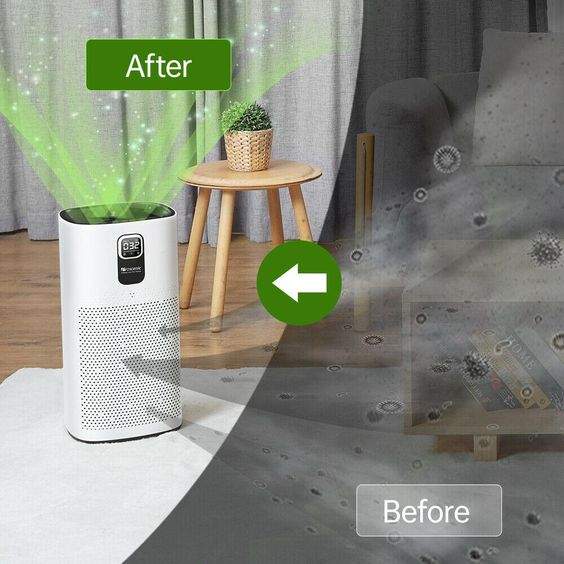
HEPA 필터로 공기질 개선
HEPA 필터는 호흡기 문제를 유발하는 입자를 포집하여 반려동물을 키우거나 오염도가 높은 도심 지역에 위치한 가정에 유용합니다. 이 필터는 알레르기 유발 물질, 먼지, 비듬을 줄여 더 건강한 환경을 제공합니다.
낮은 유지보수, 높은 효율성
HEPA 필터는 내구성이 뛰어나며 일반적으로 사용량에 따라 6~12개월마다 교체하면 됩니다. 수명이 길고 유지 관리 요구 사항이 적어 장기적인 공기질 관리를 위한 비용 효율적인 솔루션입니다.10.
HEPA 필터는 유지 관리가 거의 필요하지 않습니다.True
HEPA 필터는 자주 교체할 필요가 없어 편리함과 안정성을 제공합니다.
결론
HEPA 필터는 미세 입자를 포집하여 실내 공기질을 개선함으로써 더 깨끗하고 건강한 환경을 보장하는 입증된 매우 효과적인 솔루션입니다. 원래 군사용으로 개발된 HEPA 필터는 안전성, 신뢰성, 지속적인 발전으로 인해 가정, 직장, 의료 시설에서 공기 정화를 위해 선호되는 선택입니다.
-
HEPA 여과 효율: HEPA 필터는 0.3마이크론에서 99.97%의 입자를 제거하여 미세 입자 및 알레르기 유발 물질을 제거하는 데 이상적입니다. ↩
-
HEPA 필터의 의료용 사용: HEPA 필터는 병원균이 없는 공기를 보장하고 오염을 줄이기 위해 의료 시설에서 일반적으로 사용됩니다. ↩
-
이온화 여과의 위험성: 이온화 및 플라즈마 기술은 호흡기를 자극할 수 있는 오존을 방출할 수 있습니다. ↩
-
HEPA 및 VOC 여과: HEPA는 입자에는 효과적이지만, VOC는 흡착을 위해 활성탄 필터가 필요합니다. ↩
-
알레르기 완화를 위한 HEPA: HEPA 필터는 공기 중 알레르기 유발 물질을 줄여 민감한 사람의 건강을 개선하는 데 효과적입니다. ↩
-
HEPA 필터의 건강상의 이점: HEPA 기술은 알레르기 유발 물질, 호흡기 문제 및 전반적인 실내 공기 오염을 줄이는 데 도움이 됩니다. ↩
-
HEPA의 군사적 기원: 미군에서 개발한 HEPA 기술은 처음에는 방사성 입자를 걸러내는 데 사용되었습니다. ↩
-
고급 HEPA 미디어 기술: HEPA 필터 미디어의 혁신으로 이제 공기청정기의 공기 흐름은 높이고 저항은 낮출 수 있습니다. ↩
-
탄소 필터와 함께 HEPA 사용: HEPA와 활성탄을 함께 사용하면 입자와 VOC를 제거하여 공기질을 개선할 수 있습니다. ↩
-
HEPA 필터 유지 관리: HEPA 필터는 수명이 길고 가끔씩만 교체하면 되므로 장기간 사용하기에 비용 효율적입니다. ↩


